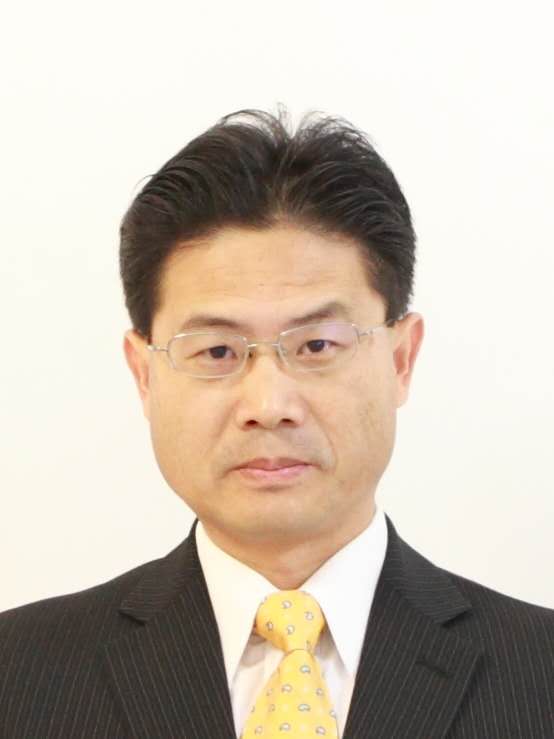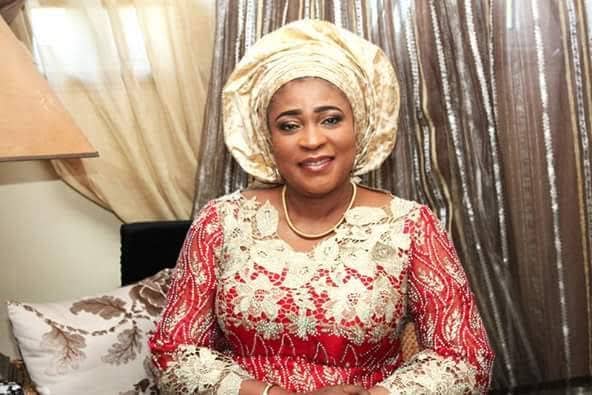Easily one of Africa’s most illustrious sons, the continent’s promoter – in – chief, and President, African Development Bank Group Dr. Akinwumi Adesina’s pro-Africa shuttles across the globe is receiving attention. He recently emerged African of the Year 2019 in the continent’s premium vote-based poll, which attracts over 1 million votes from Africans across the globe and reserved for Africans who are contributing towards promoting the continent and positively altering her narrative.
Often described as Africa’s Developer – in – Chief; Optimist – in – Chief and Economic Commander, Dr. Adesina believes that Africa does not need to beg to be developed and he tells us why in this exclusive interview. Dr. Akinwumi in this interview with African Leadership Magazine also speaks on the Bank’s activities, investment in Africa and the gains of a connected continent. Excerpts:
The African Economic Outlook report 2020 was recently launched by the African Development Bank which called for urgent investment in education, due to the large skills gap and mismatch. What informed this position?
Yes. So, the African Economic Outlook Report was launched recently and I must say I am really proud of the report, as well as the continent. So, simply put, the report says that Africa’s growth rate last year was 3.4%; this year it is projected to be 3.5% and next year it is anticipated to be 4.1%. However, that doesn’t tell you the whole story. We actually have 20 countries that are growing by 3.5% and another 20 countries that are growing at above 5% – well above the global average. Look at Rwanda for instance, which is growing at over 8%, Ghana 7.4%, Ethiopia 7.4%, Benin 6.7%, among others. But what is actually mindboggling is that those growth rates are not contributing towards reducing the number of extremely poor people on the continent.
So, this is good, but as I said, nobody eats GDP. Growth must be felt in the lives of the people. Growth must make a difference in our lives – things like access to quality healthcare, access to water sanitation, access to education, and access to a quality life. So, the report shows that Africa needs to do more in the area of education. We are doing pretty much at the moment, but we need to do more, like invest in physical infrastructure. But physical infrastructure is not enough. Our report shows that, if you invest in infrastructure and human capacity, we can increase the GDP to more than 30%. So, it’s not just about investing, but, strategic investments.
We are in the era of the 4th industrial revolution. You have automation, artificial intelligence, robotics, biotechnology and nanotechnology. So, we have got to retool and reskill, because all these new developments mean that the world is moving rapidly. So, as a bank we have launched a program called Jobs for Youths in Africa, to help the continent create twenty-five million jobs over the next ten years. We are investing and working with Microsoft and Google to set up coding centres across the continent because coding would be the currency of the future. So, we are investing in the jobs of the future and not the jobs of the past. That said, I am very excited about Africa’s prospects. That’s why they call me Africa’s Optimist in Chief and I like it.
Every year, Africa churns out about 12 million young graduates into the labour market, with only about 3 million getting job placements, and this has raised a lot of concerns. How else is the Bank looking to help in addressing this obvious challenge?
Three days after my election and resumption in 2015, I went to Goree Island in Senegal, which was one of the major spots for slave trade. There is this door that is called the ” door of no return”, where they show the slaves to their boats and they will never come back as the ship sets sail. Africa lost so many of our brothers and sisters. When I got back and I sat in my office, just ruminating over the experience because I was overwhelmed by it. And I said myself, “these strong Africans were taken against their own volition and thrown into these rickety boats and big ships and taken to the UK and US; but today, we have our young people, on their own volition jumping into these boats to go to Europe.” You can see the irony. So, I said to myself, the future of African youths does not lie in Europe, it doesn’t lie in Asia, the United States, Latin America or anywhere else. It lies in an Africa that is growing well, an Africa that is able to create quality jobs, and able to provide opportunities for its young people.
That is why for us when you mention the issue of unemployment, we say that it’s because we are not investing in our young people. The education system is not teaching them to be entrepreneurs. What did Jack Ma study – English. In 1994, Jack Ma didn’t know a thing about computers. Within a space of 10 years, he built this global brand called Alibaba. So, entrepreneurship is critical. Secondly, we need to train them in high growth areas. I have nothing against Arts, Literature and others, but the jobs of the future are going to require science, engineering, physics and maths. We have just about 3% of our graduates studying in these areas. We have some of the centers that we are working on – we have one in Kigali, the Kigali Institute of Science and Technology, which is producing world-class masters’ students.
Today, we are partnering with the Carnegie Mellon University. One of our students, 3 years after graduation, set up her own digital business, which she has just sold for $21 million. So, that tells you that opportunities abound in this sector. Agriculture is also another sector that creates a tremendous amount of jobs for our young people and I am very excited about this.
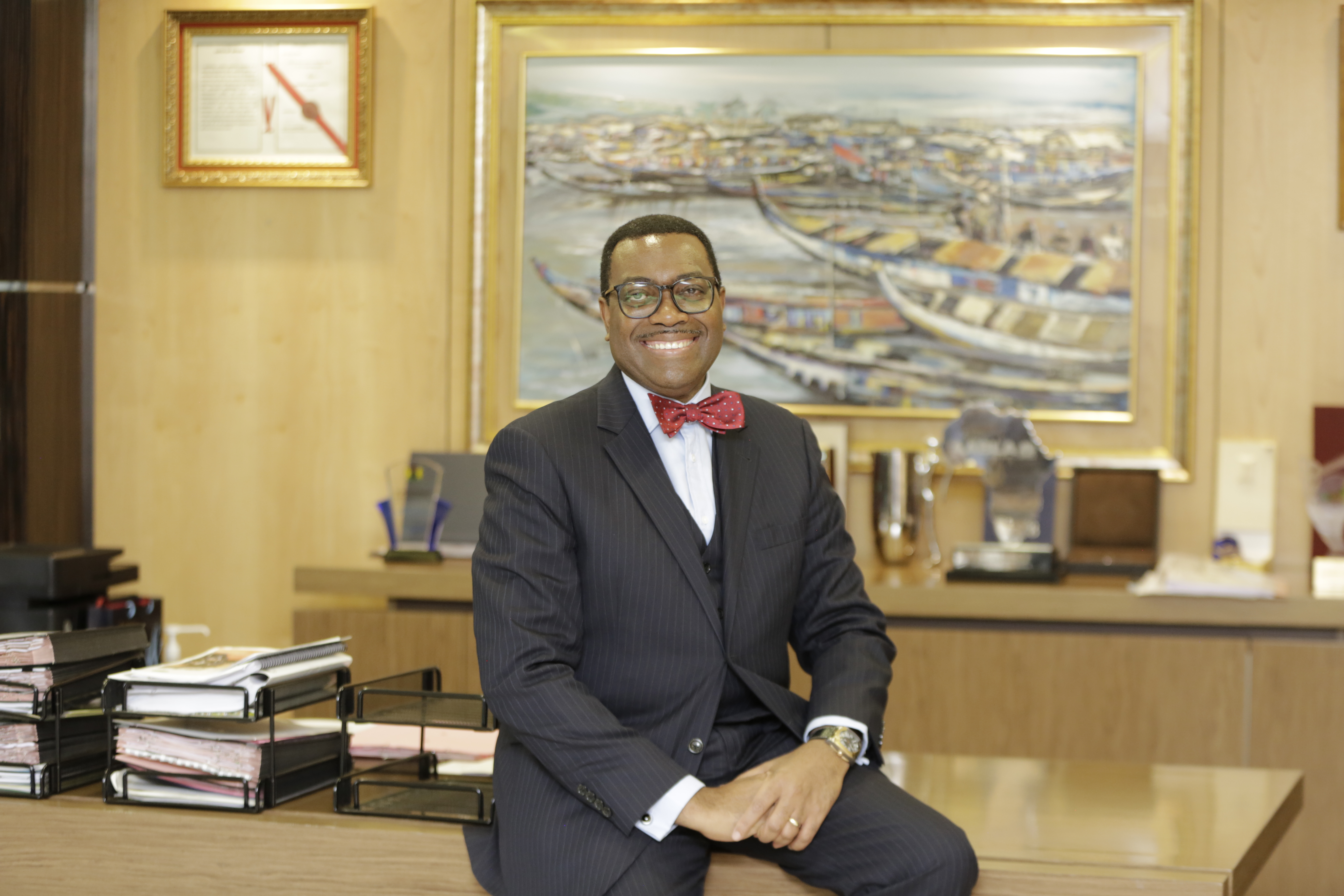
You have remained one of the continent’s major promoters of Agriculture, why is this a priority for you?
I schooled in the United States, in Indiana, and I have seen how much wealth is involved in Agriculture. I also realized that the wealthiest people in the United States are Farmers. Do not forget that, Jimmy Carter, the former president of the United States was a peanut farmer. Agriculture is not about peasantry. The food business is the biggest business in the world. I am sure you have had your breakfast, you are going to have lunch, and you will have dinner. The size of the Agricultural market in Africa is going to be worth a whopping $1 Trillion by 2030. So, what is all the fuss about Oil and what is all the fuss about Gas?
The key is to see Agriculture as a business. You produce, you store, you process and add value and you export. Africa is responsible for about 75% of the world’s production of Cocoa beans. Without Cocoa, you can’t have chocolates. Africa accounts for only 2% of the world’s chocolate market that is worth $1.2 billion every year. You can see the irony. Check the case of coffee – we produce most of the coffee beans, but when you go to Starbucks, you pay more for coffee. The case of cotton is the same. We export cotton, and we import textiles and apparels. The price of all these raw materials may drop, but the price of the products will never fall. So, as far as I am concerned, Agriculture is about value addition. It’s about industrialization.
During the African Investment Forum last year, AfDB together with credit Suisse, provided Ghana with a total package of $600 Million to help them with their cocoa centre – to help in the industrialization process. I was so proud when the president of Ghana brought some nice Ghanaian chocolates and showcased it to us. The biggest sector that can create a massive amount of jobs in agriculture, but we must change our mindset. Agriculture is not a way of life, but a business. How do you think Kentucky fried chicken makes money? how about Kelloggs? They all specialize in processing and value addition.
How can we change the mindset of people towards Agriculture, especially young people?
If you are a mechanical engineer, working for Ford or Toyota, it’s a dirty piece of work. If you are an architect or a civil engineer, it’s all the same. It’s the same for farming and agriculture. Agriculture is the coolest thing you have; the sexiest profession you have. When I was Minister of Agriculture in Nigeria, I helped turn the sector around and made it into a business. I attracted young people. I used to wear my bow tie and people will wonder what type of Agric Minister is this. I will tell them, “look, I want you to know that Agriculture is cool.” We must understand that the opportunities are immense. Opportunities are there in commercial production, there are also opportunities in logistics, and transport, marketing, packaging and a whole lot in the value chain.
One of my best moments as a minister was when Aliko Dangote, Africa’s richest man, walked into my office one day, because he and I used to have a lot of arguments about policies and because he used to be the biggest importer and I wanted him to be the biggest producer. So, he came into my office one day and said, “Minister, I have decided to change my business model and I want to move from being an importer to a producer and I said well done”. So, I said what does that mean, and he said, “I am going to put $300 Million on the table and I want to go into commercialized production”. I called my wife and also called Koffi Annan, bless his soul – he used to be my mentor. Three months later, Aliko comes back to me and says, “Minister I think I changed my mind,” and I said, “what did I do wrong”, and he said, “I changed my mind from $300 Million to $1 Billion”. Today, he is investing well over $8 Billion in Agriculture.
When you started your presidency at the Bank, you did say that it’s not a job for you. You said that this is more like a mission. Can you elaborate on this?
When I took this job, I said it’s not a job, but a mission, because there is nothing more important than to be given the opportunity to change the destiny of your own people. So, for me it has always been, what can we do better and faster. My principle for work is quite simple, I ask myself, “what are you ashamed of” and I do the opposite. As you know, a very large percentage of our people do not have electricity and when I came, I said this has to be a priority – to light up Africa. Thomas Edison invented the light bulb in 1862, so why is it that we cannot light it up. Secondly, we were spending more than $35 billion importing food, when God has blessed us with land, water, good rain and sunshine. What’s that brain behind that? So, my second priority was to feed Africa. Third mission – I looked and saw that Africa was exporting a lot of its raw materials – gas, oil, minerals, metals, Agricultural products. Again, that was a no – brainer, just industrialize and add value to what you have. The secrets of nations wealth are very clear. The nations who export raw materials become poor; the nations who export value products become very wealthy.
So, industrialize Africa was the third priority. The fourth was that we looked at the 54 countries, isolated and trying to compete against each other and I said, no, we need economies of scale in production, trade and investment. So, the fourth priority was to interconnect Africa. The fifth priority, improve the lives and living conditions of Africans, because, even if you have all the above, and your GDP is growing, no one eats GDP. We have been on this in the last four years and I can tell you that we are so proud of ourselves, proud of our shareholders, and proud of the continent. We have worked so hard. In the last four and a half years, we have been able to connect 18 Million people to electricity.
In Agriculture, we have been able to connect 140 million people to technology and the required skills to grow. We have been able to get 13 million people to access finance. We have also been able to invest in transport. We have been able to provide improved transport systems for about 101 million people. When it comes to water and sanitation, we have been able to impact 60 million people. That’s about 733 million people. While I am proud of this, I know it is not a finished work. When we come out, we still see a lot of needs. I am very bold to say that, development is not theory, it must translate into meaningful changes in people’s lives, that’s when the rubber meets the road. For me as the president of the bank, it’s a mission, it is a heartbeat for me. The quality of the lives of our people must get better and better every day.
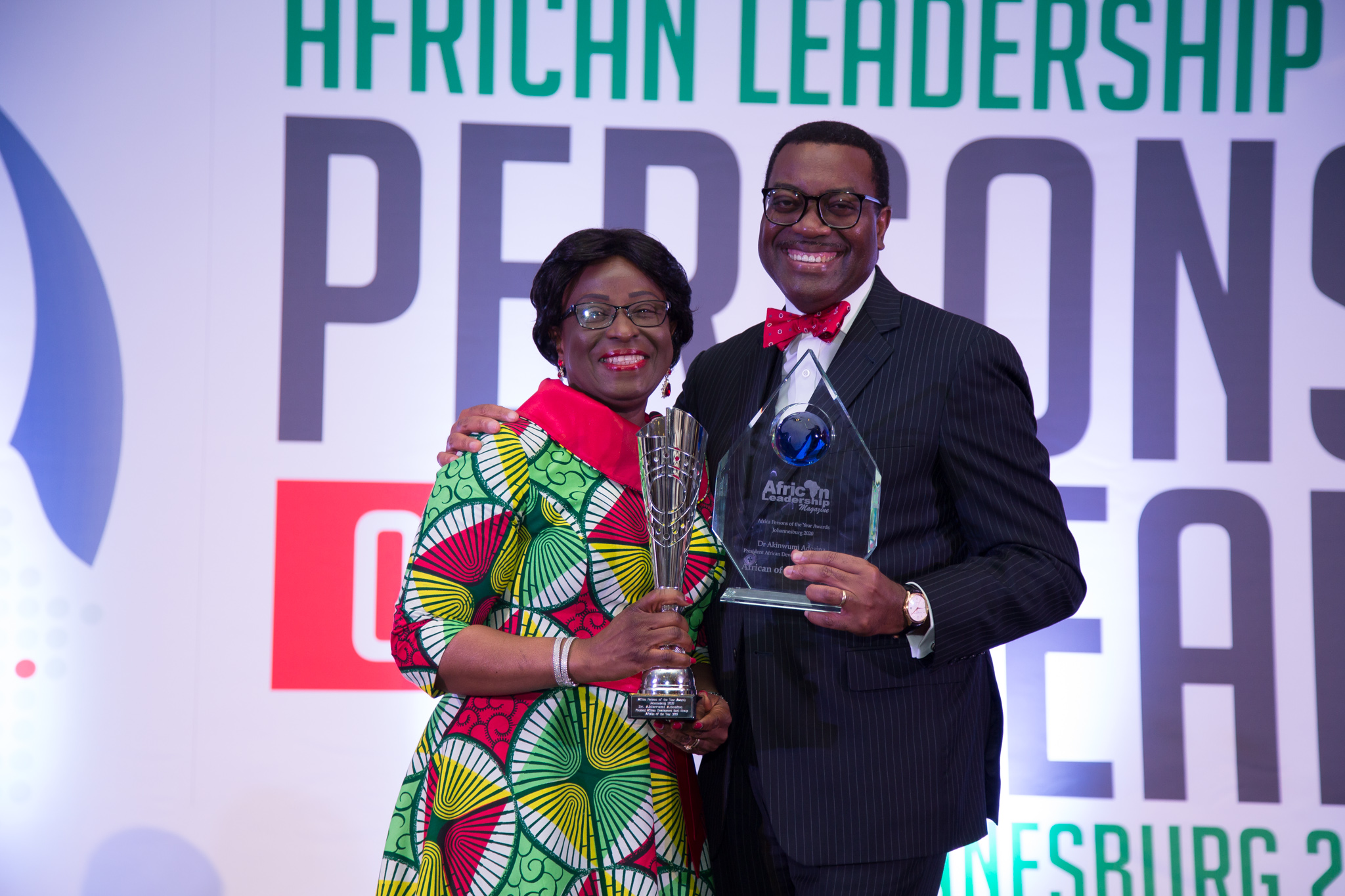
President, African Development Bank Group Dr Akinwumi Adesina and his beautiful wife Grace Adeshina pose with his African of the Year Award trophy and award plaque during the 8th African Leadership Persons of the Year Award.
Investors appetite for the continent in the areas of Energy and Infrastructure seems to be dwindling, owing to policy inconsistency among others. How do you address investors’ concerns regarding policy issues and other associated problems?
Well for me, I don’t like to look at a glass as half empty. I like to look at it as half full. Let’s take infrastructure, Africa has an infrastructure deficit – roads, rail, port and taken together, the total financing need is about $68 billion to $108 billion a year. So, it depends on how you look at it. Those numbers don’t scare me, because, I look at it as $68 billion to $108 billion a year investment opportunity. It’s a huge market of unmet demands. The lenses through which you look at things will determine how you approach them. I look at them as investment opportunities. So, when you take the case of Infrastructure, people will tell you it’s because of the risks that they are not investing. If you know how to swim, you will never be scared of water. If you don’t know how to swim, every time you look at water, what you see is risks. So, just learn how to swim. Africa is not as risky as people tell you.
There was a report, the Moody’s investors report, which shows that from 1986 to 2016, the loss rate on loans globally has Africa as the second-lowest default rate globally, second only to Saudi Arabia and the Middle East countries. Much lower than Latin America, Asia, Europe and the Caribbean. So, it is not the risks, because the data doesn’t confirm so. I am not denying that there are no risks, we have risks everywhere. In Africa, the risk is exaggerated. A lot of it is perception of risk. As you know capital is going to all those places with higher risks. Let’s come to the substance of the issue on how to deal with this. For regional infrastructure connectivity, as a bank, we have done almost $20 billion in the last four years. We have invested in roads, ports, bridges among others. We have also invested in the Sene-Gambia bridge, connecting Senegal and Gambia.
They awarded it since 1974, but we just finished it this year. We did the Lome Container port. We also did the Walvis bay port in Namibia. This has helped enlarge the volume of trade going on in that region. We co-financed the largest concentrated solar power plant in Morocco. We financed about 1000 Kilometer stretch of roads coming from Addis Ababa to Nairobi and this has helped to increase trade between those two countries, by about 400%. We are also going to finance the Lagos-Abidjan Expressway, that will open up opportunities across this region. So, we are investing in infrastructure. However, two things are very important – first is that the policy environment must be stable, because, returns on infrastructure is a long-term plan. So, policy consistency is key. Election cycles come and go, people win, some loose, but businesses must continue.
In the energy sector, the tariff is so low, and those that are investing cannot make money. The third concern is that infrastructure doesn’t have to be done by governments alone. In fact, the majority can be done by the private sector. As kids growing up in Nigeria, we used to see landline telephones and as kids, we would fly kites and it would get stuck in the lines that you see in the sky, but where are they today? At some point in the year 2000, the whole of sub- Saharan Africa didn’t have as much phone lines as the whole of Manhattan.
Today, you have more than 400 million telephone users on the continent. So, technology changed the whole dynamics. The private sector brings innovation. Fourth point is that we have to make sure that we are building quality infrastructure. You build a road, today and the rains come and washes it away after six months – no, that’s not accountability. So, we must build quality infrastructure that will last for a long time. At the end of the day, it’s about investments and I am excited about Africa. You look at us with a population of 1.2 billion people today and projected to be 2.4 billion by 2050, and I say this is a huge advantage.
Last year, foreign direct investment in Africa grew by 11%, while Asia was only 4%. The developed economies had their foreign direct investment declined by 23% and globally, foreign direct investment declined by 13%. Our labor force alone is about 705 million people and it’s going to grow by over 1 billion by 2050. So, if you are not in Africa, where are you? Africa is the frontier and that is why I am driven to make sure that we put our best foot forward. Africa is going to develop by the discipline of investment and doing the right thing to attract the right investments. We set up the Africa Investment Forum 2 years ago, In South Africa. We got our development partners from around Africa, and worked with so many other banks, including the African Finance Corporation.
We set up this as a platform that would attract investments to land in Africa, like an aeroplane, landing on a smooth landing strip. We are trying to make sure that we reduce the market risks, financial, political, and all other risks to the barest minimum. It’s a forum that abhors speeches – no heads of state come and give speeches. They come as chief executive officers of their countries. The project developers, project promoters, financiers, insurance companies and investors were all in a boardroom session and the heads of state will make pitches about their countries and why they will do somethings differently, after which deals are sealed. The first year, 2018, we were able to secure investment interests of about $38 billion in less than 72 hours. In 2019, we secured investment interest for projects worth $40.1 billion all in less than 72 hours. So, what does that tell you? We are brimming with opportunities. This is a resurgent Africa, a more confident continent. This is an Africa that needs to continue to showcase itself to the world. It is not a continent that is going to beg to be developed.
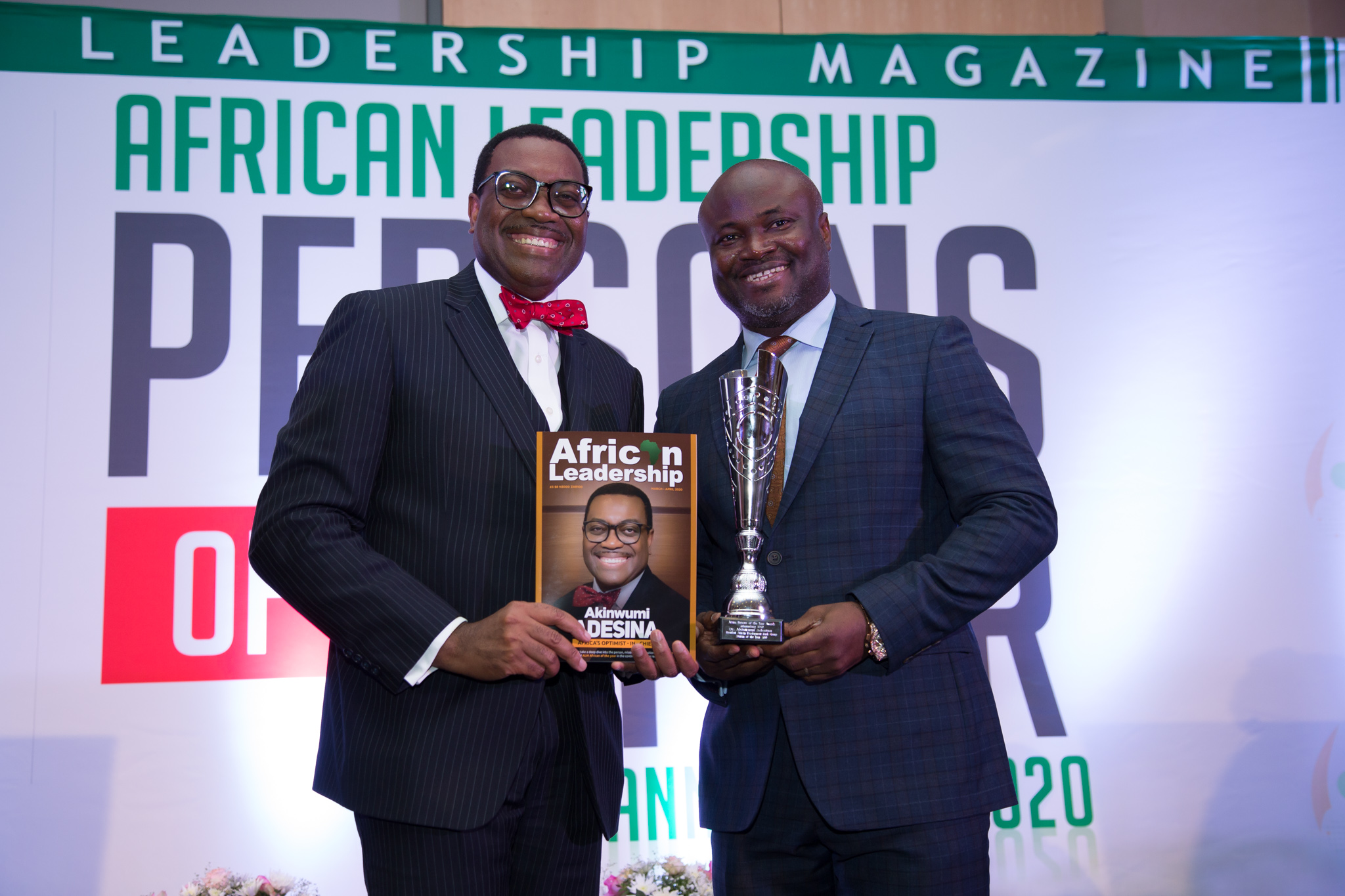
President, African Development Bank Group Dr Akinwumi Adesina and the Publisher African Leadership Magazine pose for photographs at the 8th African Leadership Persons of the Year Gala.
When will Africa host world leaders on the continent, towards attracting investment into their countries, a position that was reechoed by some during the last UK – Africa summit.
My take is that Africa is not going to beg to be developed. Those who understand risks and return are already voting with their money. I just gave you the numbers. The African Continental Free Trade Area, which brings together all the economies of the continent, is worth $3.3 trillion. So, African countries individually are not going to be negotiating trade deals with other countries, because that would be a negotiation from the point of weakness. African countries will be negotiating from the point of collective strength. The continent can say to the EU, here is our market, instead of negotiating with individual countries – now we want to deal with you as a continent.
I addressed the UK House of Commons and the House of Lords and told them that they have to understand that the game has changed. The kid of yesterday is an adult today and we need a partnership of equals. The engagement has to be different. With a $3.3 trillion economy, Africa doesn’t have to beg anybody. That changes the dynamics of engagement. We at the African Development Bank have continued to push for universal access to electricity, the ports, the rail and the roads so that we can trade and be competitive. I don’t think Africa needs the heads of governments to come to the continent, because, it’s not governments that invest, it’s the private sector and they are already voting with their feet and their pockets.
I think Africa just has to continue to do the right thing – have good macroeconomic stability; make sure the exchange rate is stable; make sure you are dealing with corruption, transparency and accountability in the public space; and have the incentives to attract the private sector to come. The interest rate all around the world is very low, people are investing in the money market that are giving them negative returns. However, anyone who understands basic economics that talks about the law of demand and supply will tell you that, when the demand is high, the price is high. So that means that Africa needs energy and it doesn’t have enough; it needs ports because it doesn’t have enough; it needs rail because it doesn’t have enough. It means the return on your investment will be high.
Over 55% of the continent’s population are women and we would like to know how the Bank is engaging this important segment of the population?
The day that our continent gets it right with women empowerment, Africa will grow in a phenomenal way. When women earn income, they spend 90% of that on their children and family. I took a trip in 1992, from Lagos to Abidjan, at that time I was working in Bouake, as the chief economist for Africa Rice Center, and I got on an aeroplane with my small computer. So, when I got on the plane and saw all these women – market women, and they were very fat and I was wondering, how come all of them are so fat. All of a sudden, I realized that they were not fat as I thought, they only wrapped bails of clothing around themselves.
They were doing that because the customs people were overtaxing them. I was still trying to find a spot for my luggage and I requested the Air hostess to help me. She said, “you see these women, they are market women, they look like illiterates, but they fly this route twice a day. This is their plane; we make room for them to put whatever they want to put, but we will put your bag in the holding area”. It never left my imagination. So, when I had this God-given opportunity to serve as the president of the Bank, I sat down and said to myself, when we had a structural adjustment in Africa, the women saved the continent. 75% of all our trade is done by all these women.
So, I said as a bank, we must do something different for them. We launched what is called, the Affirmative Finance Action for Women in Africa, AFAWA – which focuses on leveraging $3 billion for businesses of women in Africa, the biggest of such projects in the history of the continent. President Macron of France was quite helpful when he invited me to Paris for the G7 meeting. He helped to organize and reached out to all the G7 leaders and collectively, they put together $351 million that will help us to set up a risk-sharing facility, that will reduce the risk of lending by Banks to women.
Now we have over $411 million. We are working with the Africa Guarantee Fund, and they are setting up facilities with Banks. When a Bank lends to women businesses, we will cover up to about 75% of any loss that may accrue from the borrowing. I know the women are not going to default because 98% of the women pay back their loans. Men are the ones that don’t pay back their loans. The women are bankable and the reason the Banks are not lending to them is that they are biased. Banks ask them for collateral, when you know in Africa, they don’t own land. So, we are putting our money behind them and we are supporting them. We are supporting another fund, called the Alitier Fund, jointly set up by a South African and a Nigerian – a private equity fund that we have supported to raise more money for growth businesses for women. So, all that we are doing for women came from my experience on the plane from Lagos to Abidjan.
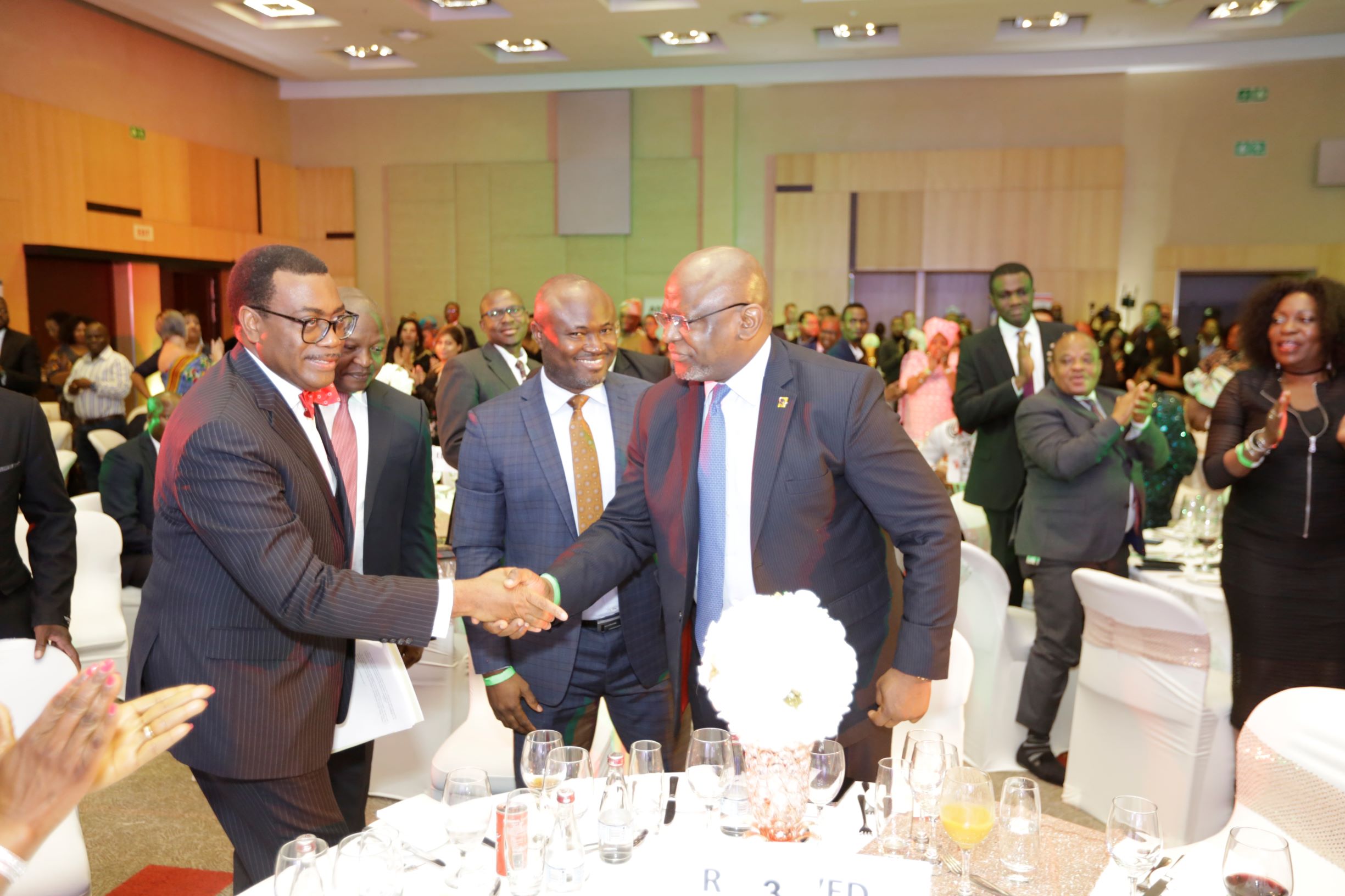
Akinwunmi Adeshina, President AfDB receiving Adesola Kazeem Adeduntan, MD/CEO, First Bank Nigeria during the 8th African Leadership Persons of the Award Gala which took place on the 29th February at the Sandton Convention Center, Johannesburg, South Africa.
You have been Nigeria’s Minister of Agriculture, and also worked with the Rockefeller Foundation, and you have shown excellence. What drives your pursuit for excellence?
First, I think its God’s grace, because, those who know me will tell you that I am constantly charged and always want things to be better. I also believe that life itself is only useful to the extent that it is used to make the life of other people better – otherwise, what’s the use of life itself. It’s not about you, but about what you use your life for. So, I am constantly driven by that. I handed over a map to a minister in a particular country, and he said to me, “this is a beautiful map” and I said, “minister, it is not a beautiful map, the red there indicates those without food, water and sanitation.”
For me, I do what I do with all my heart and with a sense of accountability only to God. I came out of a very poor background, my father and grandfather worked as labourers in other people’s farms. So, for me to rise to the global stage today, it has been God. I always say, “how can we make things better?” My life, my ideas, my partnerships, my contacts, my innovations and creativity that God has enabled me to are all directed to one thing, which is making things better. I think that would be a life worth living.
What would you say to those who voted you African of the Year 2019?
You know, I didn’t even know that anything like this was going on until a friend of mine told me that there was voting going on. So, I feel tremendously honoured and very grateful. I feel tremendously encouraged by this and inspired. I am an African and proudly African, and I know that the responsibility that I have been given is to do all that is within my power, by God’s grace, to constantly move Africa forward. So, I want to thank Africans for the confidence, but it’s not a confidence I take lightly. Awards are good, but they are not for you to just take and have it. Awards are supposed to inspire you to do more.
My definition of awards, maybe I should just give it to you, because, it helps keep me in check. A-means accepted; W-with; A-an agreement; R-regarding; D-doing more S-selflessly. So, all I can say to all those who nominated and voted, God bless you all. My team and I at the Bank work every day to make things better in the lives of Africans. The heads of state support us very strongly, the private sector, the civil society, they all support us very strongly. I am not working alone; I am working with so many people. At the end of the day, it is about doing more and doing it selflessly. We promise that by the grace of God, we will do more selflessly.

